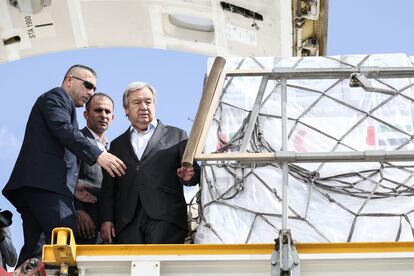Humanitarian aid to Gaza is delayed until Saturday at least due to shipment inspection
UN Secretary General Antonio Guterres flew to Egypt to try to unblock the delivery of urgently needed food, water and medicine. Dozens of trucks are waiting at the Rafah crossing on the border

The difficulty of meeting the conditions set by Israel and the United States to allow humanitarian aid to enter southern Gaza from Egypt (that not a single package must end up in the hands of Hamas, the movement that has governed the Strip since 2007 and manages the crossing on the Palestinian side) has kept trucks loaded with food, water, and medicine blocked in the Sinai desert for days. The Secretary General of the United Nations, António Guterres, traveled urgently this Friday to the El Arish airport, designated by Cairo as a logistics center and located just 31 miles (50 km) from the border, to try to unblock the situation. Although without citing them directly, Guterres has made it clear in his statement to the media that the aid has not crossed the border due to the “conditions and restrictions” set by Israel and the United States. An agreement was reached last week to let much-needed aid through, and Egypt has removed the slabs of concrete that had been placed as barriers for fear of a massive influx of refugees.
The pacts between Israel, the United States and Egypt for the entry of humanitarian aid, announced Wednesday, include “conditions and restrictions,” Guterres said on Friday. “We are now actively engaging with all the parties, actively engaging with Egypt, with Israel, with the U.S., in order to make sure that we are able to clarify those conditions, that we are able to limit those restrictions in order to have as soon as possible these trucks moving to where they are needed.”
The UN Secretary General lamented the paradox that just a few miles away there are “two million people who are suffering enormously.”
At least 145 trucks are waiting on the Egyptian side of Rafah loaded with humanitarian aid from Egyptian organizations, explained Ahmed Salem, director of the Sinai Foundation for Human Rights, which has released images showing two rows of trucks with supplies parked right in front of the gate. In another video from the organization, volunteers are standing in front of the crossing with banners, Egyptian and Palestinian flags, and portraits of President Abdel Fattah el-Sisi. The rest of the supplies, including those sent by other countries (such as Jordan and Turkey) and organizations such as the World Health Organization and the European Union, are stored where Guterres landed, at El Arish airport.
Washington announced permission for 20 trucks to enter, but so far it has not happened. The United Nations emergency aid coordinator, Martin Griffiths, said that aid could arrive “tomorrow (Saturday) or something like that.” “We are in intensive and advanced negotiations with all relevant parties to ensure that the Gaza relief operation starts as soon as possible,” Griffiths said, quoted by a spokesperson for the UN Office for the Coordination of Humanitarian Affairs (OCHA). The delay in the agreement is not only due to discrepancies over the aid inspection mechanism, but also to the issue of the departure of those with foreign passports from Gaza, according to Reuters.
The pact between the United States, Israel and Egypt only allows the entry of food, water and medicine, and then only for the south of the Strip. There will be no supplies coming from Israel for as long as the at least 205 Israeli hostages remain captive in Gaza.
Israeli Prime Minister Benjamin Netanyahu made it clear in a statement that Israel “will not prevent” humanitarian supplies from Egypt “as long as they do not reach Hamas.” Southern Gaza is the area where the Israeli Army has ordered the 1.1 million residents in the north to go, in a decision criticized by the UN and humanitarian organizations, as a way to facilitate the next phase of the offensive, the land invasion.
More than 3,700 Palestinians have been killed in and around Gaza since the start of hostilities following the October 7 Hamas attack on Israel. In Israel, some 1,400 people have been killed, including more than 300 military personnel, and more than 200 people are still being held hostage by Gaza militias. In the West Bank, 64 Palestinians have been killed in confrontations with Jewish settlers and security forces.
Sign up for our weekly newsletter to get more English-language news coverage from EL PAÍS USA Edition
Tu suscripción se está usando en otro dispositivo
¿Quieres añadir otro usuario a tu suscripción?
Si continúas leyendo en este dispositivo, no se podrá leer en el otro.
FlechaTu suscripción se está usando en otro dispositivo y solo puedes acceder a EL PAÍS desde un dispositivo a la vez.
Si quieres compartir tu cuenta, cambia tu suscripción a la modalidad Premium, así podrás añadir otro usuario. Cada uno accederá con su propia cuenta de email, lo que os permitirá personalizar vuestra experiencia en EL PAÍS.
¿Tienes una suscripción de empresa? Accede aquí para contratar más cuentas.
En el caso de no saber quién está usando tu cuenta, te recomendamos cambiar tu contraseña aquí.
Si decides continuar compartiendo tu cuenta, este mensaje se mostrará en tu dispositivo y en el de la otra persona que está usando tu cuenta de forma indefinida, afectando a tu experiencia de lectura. Puedes consultar aquí los términos y condiciones de la suscripción digital.








































